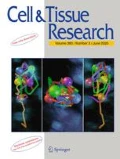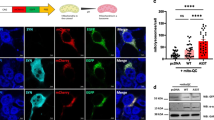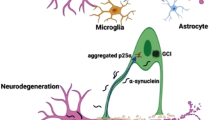Abstract
The ubiquitin proteasome system is an important cellular pathway that ubiquitinates damaged proteins and degrades them via the 26S proteasome. Abnormalities of this pathway can result in molecular protein aggregation and have been associated with Parkinson’s disease (PD). UCHL-1, an enzyme central to the system, possesses catalytic hydrolase activity that can hydrolyze peptide-ubiquitin bonds and recycle ubiquitin monomers for re-use in the same process. Recently, UCHL-1 has been shown to possess a second dimerisation-dependent ligase activity and, at least in vitro, this ligase activity promotes alpha synuclein aggregation. UCHL-1 was first implicated in PD by the discovery of an I93M mutation identified in a German sib-pair with probable autosomal dominant PD. Although no further UCHL-1 mutations have been identified, a common non-synonymous S18Y polymorphism has been suggested to reduce disease susceptibility in non-mendelian forms of PD. In vitro functional data support this protective effect, with evidence that S18Y possesses reduced ligase activity compared with wild type UCHL-1. One study has found increased hydrolase activity associated with S18Y, although another study has not. Important issues regarding UCHL-1 and its role in PD remain inconclusive, especially regarding the pathogenicity of the mendelian I93M mutation. This review tries to address some of these uncertainties.
Similar content being viewed by others
References
Choi J, Levey AI, Weintraub ST, Rees HD, Gearing M, Chin LS, Lian L (2004) Oxidative modifications and downregulation of ubiquitin carboxy-terminal hydrolase L1 associated with idiopathic Parkinson’s and Alzheimer’s diseases. J Biol Chem 13:13256–13264
Ciechanover A, Orian A, Schwartz AL (2000) The ubiquitin mediated proteolytic pathway: mode of action and clinical implications. J Cell Biochem 34(Suppl):40–51
Couzin J (2002) Human genome. HapMap launched with pledges of $100 million. Science 298:941–942
Dauer W, Przedborski S (2003) Parkinson’s disease: mechanisms and models. Neuron 39:889–909
Dawson TM, Dawson VL (2003) Molecular pathways of neurodegeneration in Parkinson’s disease. Science 302:819–822
Elbaz A, Levecque C, Clavel J, Vidal JS, Richard F, Correze JR, Delemotte B, Amouyel P, Alperovitch A, Chartier-Harlin MC, Tzourio C (2003) S18Y polymorphism in the UCH-L1 gene and Parkinson’s disease: evidence for an age-dependent relationship. Mov Disord 18:130–137
Goldstein DB, Ahmadi KR, Weale ME, Wood NW (2003) Genome scans and candidate gene approaches in the study of common diseases and variable drug responses. Trends Genet 19:615–622
Harhangi BS, Farrer MJ, Lincoln S, Bonifati V, Meco G, De Michele G, Brice A, Durr A, Martinez M, Gasser T, Bereznai B, Vaughan JR, Wood NW, Hardy J, Oostra BA, Breteler MM (1999) The Ile93Met mutation in the ubiquitin carboxy-terminal-hydrolase-L1 gene is not observed in European cases with familial Parkinson’s disease. Neurosci Lett 270:1–4
Hershko A, Ciechanover A (1998) The ubiquitin system. Annu Rev Biochem 67:425–479
Hochstrasser M (1996a) Protein degradation or regulation: Ub the judge. Cell 84:813–815
Hochstrasser M (1996b) Ubiquitin-dependent protein degradation. Annu Rev Genet 30:405–439
Kitada T, Asakawa S, Hattori N, Matsumine H, Yamamura Y, Minoshima S, Yokochi M, Mizuno Y, Shimizu N (1998) Mutations in the parkin gene cause autosomal recessive juvenile parkinsonism. Nature 392:605–608
Kruger R, Eberhardt O, Riess O, Schulz JB (2002) Parkinson’s disease: one biochemical pathway to fit all genes? Trends Mol Med 8:236–240
Leroy E, Boyer R, Auburger G, Leube B, Ulm G, Mezey E, Harta G, Brownstein MJ, Jonnalagada S, Chernova T, Dehejia A, Lavedan C, Gasser T, Steinbach PJ, Wilkinson KD, Polymeropoulos MH (1998) The ubiquitin pathway in Parkinson’s disease. Nature 395:451–452
Levecque C, Destee A, Mouroux V, Becquet E, Defebvre L, Amouyel P, Chartier-Harlin MC (2001) No genetic association of the ubiquitin carboxy-terminal hydrolase-L1 gene S18Y polymorphism with familial Parkinson’s disease. J Neural Transm 108:979–984
Lincoln S, Vaughan J, Wood N, Baker M, Adamson J, Gwinn-Hardy K, Lynch T, Hardy J, Farrer M (1999) Low frequency of pathogenic mutations in the ubiquitin carboxy-terminal hydrolase gene in familial Parkinson’s disease. Neuroreport 5:427–429
Liu Y, Fallon L, Lashuel HA, Liu Z, Lansbury PT Jr (2002) The UCH-L1 gene encodes two opposing enzymatic activities that affect alpha-synuclein degradation and Parkinson’s disease susceptibility. Cell 111:209–218
Liu Y, Lashuel HA, Choi S, Xing X, Case A, Ni J, Yeh LA, Cuny GD, Stein RL, Lansbury PT Jr (2003) Discovery of inhibitors that elucidate the role of UCH-L1 activity in the H1299 lung cancer cell line. Chem Biol 10:837–846
Lowe J, McDermott H, Landon M, Mayer RJ, Wilkinson KD (1990) Ubiquitin carboxyl-terminal hydrolase (PGP 9.5) is selectively present in ubiquitinated inclusion bodies characteristic of human neurodegenerative diseases. J Pathol 16:153–160
Maraganore DM, Farrer MJ, Hardy JA, Lincoln SJ, McDonnell SK, Rocca WA (1999) Case-control study of the ubiquitin carboxy-terminal hydrolase L1 gene in Parkinson’s disease. Neurology 53:1858–1860
Maraganore DM, Lesnick TG, Elbaz A, Chartier-Harlin MC, Gasser T, Kruger R, Hattori N, Mellick GD, Quattrone A, Satoh J, Toda T, Wang J, Ioannidis JP, De Andrade M, Rocca WA (2004) UCHL1 is a Parkinson’s disease susceptibility gene. Ann Neurol 55:512–521
McNaught KS, Jenner P (2001) Proteasomal function is impaired in the substantia in Parkinson’s disease. Neurosci Lett 297:191–194
McNaught KS, Bjorklund LM, Belizaire R, Isacson O, Jenner P, Olanow CW (2002a) Proteasome inhibition causes nigral degeneration with inclusion bodies in rats. Neuroreport 13:1437–1441
McNaught KS, Mytilineou C, Jonbaptiste R, Yabut J, Shashidharan P, Jennert P, Olanow CW (2002b) Impairment of the ubiquitin-proteasome system causes dopaminergic cell death and inclusion body formation in ventral mesencephalic cultures. J Neurochem 81:301–306
Mellick GD, Silburn PA (2000) The ubiquitin carboxy-terminal hydrolase-L1 gene S18Y polymorphism does not confer protection against idiopathic Parkinson’s disease. Neurosci Lett 293:127–130
Momose Y, Murata M, Kobayashi K, Tachikawa M, Nakabayashi Y, Kanazawa I, Toda T (2002) Association studies of multiple candidate genes for Parkinson’s disease using single nucleotide polymorphisms. Ann Neurol 51:133–136
Nishikawa K, Li H, Kawamura R, Osaka H, Wang YL, Hara Y, Hirokawa T, Manago Y, Amano T, Noda M, Aoki S, Wada K (2003) Alterations of structure and hydrolase activity of parkinsonism-associated human ubiquitin carboxyl-terminal hydrolase L1 variants. Biochem Biophys Res Commun 304:176–183
Osaka H, Wang YL, Takada K, Takizawa S, Setsuie R, Li H, Sato Y, Nishikawa K, Sun YJ, Sakurai M, Harada T, Hara Y, Kimura I, Chiba S, Namikawa K, Kiyama H, Noda M, Aoki S, Wada K (2003) Ubiquitin carboxy-terminal hydrolase L1 binds to and stabilizes monoubiquitin in neuron. Hum Mol Genet 12:1945–1958
Polymeropoulos MH, Lavedan C, Leroy E, Ide SE, Dehejia A, Dutra A, Pike B, Root H, Rubenstein J, Boyer R, Stenroos ES, Chandrasekharappa S, Athanassiadou A, Papapetropoulos T, Johnson WG, Lazzarini AM, Duvoisin RC, Di Iorio G, Golbe LI, Nussbaum RL (1997) Mutation in the alpha-synuclein gene identified in families with Parkinson’s disease. Science 276:2045–2047
Rideout HJ, Larsen KE, Sulzer D, Stefanis L (2001) Proteasomal inhibition leads to formation of ubiquitin/alpha-synuclein-immunoreactive inclusions in PC12 cells. J Neurochem 78:899–908
Saigoh K, Wang YL, Suh JG, Yamanishi T, Sakai Y, Kiyosawa H, Harada T, Ichihara N, Wakana S, Kikuchi T, Wada K (1999) Intragenic deletion in the gene encoding ubiquitin carboxy-terminal hydrolase in gad mice. Nat Genet 23:47–51
Satoh J, Kuroda Y (2001) A polymorphic variation of serine to tyrosine at codon 18 in the ubiquitin C-terminal hydrolase-L1 gene is associated with a reduced risk of sporadic Parkinson’s disease in a Japanese population. J Neurol Sci 189:113–117
Savettieri G, De Marco EV, Civitelli D, Salemi G, Nicoletti G, Annesi G, Ciro Candiano IC, Quattrone A (2001) Lack of association between ubiquitin carboxy-terminal hydrolase L1 gene polymorphism and PD. Neurology 57:560–561
Shi Q, Tao E (2003) An Ile93Met substitution in the UCH-L1 gene is not a disease-causing mutation for idiopathic Parkinson’s disease. Chin Med J (Engl) 116:312–313
Solano SM, Miller DW, Augood SJ, Young AB, Penney JB Jr (2000) Expression of alpha-synuclein, parkin, and ubiquitin carboxy-terminal hydrolase L1 mRNA in human brain: genes associated with familial Parkinson’s disease. Ann Neurol 47:201–210
Spillantini M, Schmidt ML, Lee VM, Trojanowski JQ, Jakes R, Goedert M (1997) Alpha synuclein in Lewy bodies. Nature 388:839–840
Voges D, Zwickl P, Baumeister W (1999) The 26S proteasome: a molecular machine designed for controlled proteolysis. Annu Rev Biochem 68:1015–1068
Wang J, Zhao CY, Si YM, Liu ZL, Chen B, Yu L (2002) ACT and UCH-L1 polymorphisms in Parkinson’s disease and age of onset. Mov Disord 17:767–771
Weissman AM (2001) Themes and variations on ubiquitination. Nat Rev Mol Cell Biol 2:169–178
Wilkinson KD, Hochstrasser M (1998) The deubiquitinating enzyme. In: Peters JM, Harris JR, Finley D (eds) Ubiquitin and the biology of the cell. Plenum, New York, pp 99–125
Wintermeyer P, Kruger R, Kuhn W, Muller T, Woitalla D, Berg D, Becker G, Leroy E, Polymeropoulos M, Berger K, Przuntek H, Schols L, Epplen JT, Riess O (2000) Mutation analysis and association studies of the UCHL1 gene in German Parkinson’s disease patients. Neuroreport 11:2079–2082
Zhang J, Hattori N, Leroy E, Morris HR, Kubo S, Kobayashi T, Wood NW, Polymeropoulos MH, Mizuno Y (2000) Association between a polymorphism of ubiquitin carboxy-terminal hydrolase L1 (UCH-L1) gene and sporadic Parkinson’s disease. Parkinsonism Relat Disord 6:195–197
We are grateful to Dr. Miratul M. Muqit, for advice and comments during the preparation of this manuscript.
Author information
Authors and Affiliations
Corresponding author
Additional information
D.G.H. is a clinical research fellow at the Institute of Neurology, Queen Square and is supported by a grant from the UK Parkinson’s Disease Society (grant no. 4073). P.A.S. is supported by a grant from the Brain Research Trust (grant no. 6AAC). N.W.W. is supported by the UK Parkinson’s Disease Society (grant no. 4029)
Rights and permissions
About this article
Cite this article
Healy, D.G., Abou-Sleiman, P.M. & Wood, N.W. Genetic causes of Parkinson’s disease: UCHL-1 . Cell Tissue Res 318, 189–194 (2004). https://doi.org/10.1007/s00441-004-0917-3
Received:
Accepted:
Published:
Issue Date:
DOI: https://doi.org/10.1007/s00441-004-0917-3




